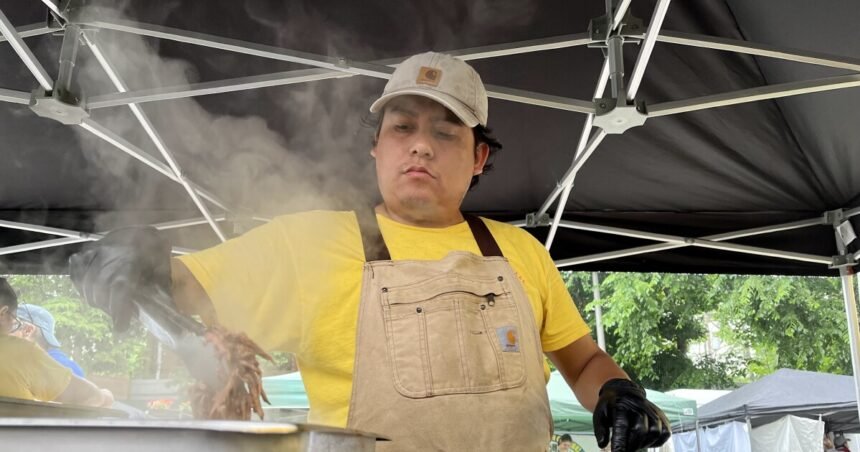Click “listen” above to hear the squeaky sound the dough makes when it’s ready at Mexican bakery Panadería Jazmin!
When Rocío Ruiz immigrated from Mexico to Pittsburgh in 1999, she says she had to drive to Cleveland for Mexican food.
Yes, Cleveland.
“There was nothing,” says Ruiz, co-owner of El Colibrí, a Pittsburgh-based Mexican restaurant known for its slow-cooked beef birria tacos, and Ruiz’s handmade gorditas and huaraches. “There was nothing Latino, really. It was very complicated to even buy groceries for Latino food.”
That’s why it was a shock to Ruiz, her daughter Jeimy Ibarra recalls, that Pittsburgh so quickly embraced their business, which launched in 2023.
“ When we grew up here in Pittsburgh, it was very hard for us. It wasn’t welcoming at the time,” recalls Ibarra, who is also a co-owner of El Colibrí, along with her husband, Pedro Ibarra. “It was hard for [my mother] to realize in 2023 that people knew what a gordita was, what a huarache was. … So that really attracted her to want to sell her food.”
Pittsburgh’s Mexican community has more than doubled during the past 15 years, and as the community has grown, so have the offerings from Mexico’s diverse cuisine, from Ruiz’ handmade gorditas to fresh-baked sweet breads to Oaxacan tlayudas. As Mexican business owners find their footing in the local food scene, they have turned to a growing variety of business models, from pop-ups to traditional brick-and-mortars.
A ghost kitchen helps El Colibrí to year-round sales
Pittsburghers may recognize El Colibrí as a fixture of the weekend farmers markets, easily spotted for their long line of customers, jewel-colored aguas frescas — and the smell of Pedro Ibarra’s birria tacos: slow-cooked beef with chiles and cinnamon, melt-in-your mouth tender, folded into a corn tortilla and sizzling on the grill. But that’s just the public-facing part of their business.
On weekdays, the team works out of The Mill Food Co in Oakland, a ghost kitchen space where multiple vendors use commercial kitchens under the same roof. There’s no storefront, but customers can order food via delivery apps or using a kiosk. When El Colibrí receives an order, they prepare it and put it in a locker, where a customer or delivery driver uses a code to retrieve it.
“ It allows me to not spend money on overhead costs … [and] to spend more time outside at farmers markets, which is what we really wanted to focus on,” Ibarra says. “So this allows multiple small businesses under one roof to start their businesses at a much slower pace and then move their way up.”
The technology at The Mill Food Co ghost kitchen is proprietary, and vendors have to sign a non-disclosure agreement to rent space there. And because restaurant owners don’t interact with customers face-to-face, and the kitchen is windowless, the experience of filling orders is very different from the non-stop pace of the farmers markets.
“ It does get lonely in the winter months when I’m not seeing people,” Ibarra says. But she asks customers on Instagram to write messages on their receipts, so when orders beep through, she can read them. One student from Carnegie Mellon even wrote them a poem. “ So people that knew us at the farmers market kind of missed us and that was a way for us to stay connected.”
El Colibrí has their sights set on growing into a food truck or brick-and-mortar.
“We were scouting a lot of spaces, but they get taken up pretty quickly,” Ibarra says. “Especially because we’re trying to stay in the Oakland, Lawrenceville, Bloomfield area.”
In the meantime, the ghost kitchen has allowed Ibarra, her husband Pedro Ibarra and her mother Ruiz to grow their business to a year-round, full-time enterprise for all three of them.
The recipe for the famous birria, by the way, is as proprietary as the ghost kitchen facility: Pedro Ibarra says it took him five years to develop it. All he’ll share is that most birrias contain three chiles.
His contains six.
Lulá’ La Chula: A pop-up model faithful to Oaxacan food traditions
On a Wednesday night in May, a group of about 40 trail runners take off racing into Frick Park, while Vladimir Martinez Rodriguez and Meghan Raffensperger set up their Oaxacan street food pop-up, called Lulá’ La Chula.
The couple met in Oaxaca in 2020, and launched their business in Pittsburgh in 2024 to showcase the variety in traditional Oaxacan cuisine. One of their signature dishes is the tlayuda: a large, crispy corn tortilla, folded over fillings such as beans, a pork grease known as aciento, melty quesillo cheese, vegetables and grilled meats.
The year-old business is pop-up only, with Lulá’ La Chula setting up at the North Side and East End farmers markets, as well as for other events such as Millvale Pride and the Frick Park Trail Race Series.
“The reason we did the pop-up scenario is because it’s most accessible,” Raffensperger explains. “We don’t need a brick-and-mortar to do this. We need a commercial kitchen to rent out of. That’s easy enough to find.”
But the pop-up format is also faithful to Oaxacan food traditions. Rodriguez grew up cooking from a very young age, the son of two street vendors in Oaxaca.
“This is how Vladimir’s parents sell food. This is how everyone in Oaxaca sells food,” Raffensperger says. “When you go to buy food in Mexico, you’re not buying it in a restaurant. You don’t go sit down somewhere. Maybe you sit down on the sidewalk, but you’re out in the street.”
Both Raffensperger and Rodriguez hold full-time jobs. The night before one of the Frick Park Trail Race events, Rodriguez stayed up all night cooking in preparation, with Raffensperger picking up the baton in the morning while he slept. But they hope Lulá’ La Chula will grow into full-time work for both of them.
“We’re slowly trying to detach from our jobs and transition into this,” Raffensperger says. “Do we have a dream of a brick-and-mortar? Yes. A lot of people try to warn us against doing it because they say it ties you down, but we are tied down either way because we have to pay bills. So I feel like if we can own something that’s ours, … it would be great.”
Panadería Jazmin’s brick-and-mortar gets a boost from a business incubator
Down in the basement of Panadería Jazmin in Mount Lebanon, baker Juan Flores makes dough for the next day’s Mexican pastries. He weighs flour, cracks eggs, pours milk and adds all of the ingredients to an automatic mixer.
The secret to knowing when the dough is ready, he says, is the sound. The dough in the mixer goes from sounding wet and squishy to making a high-pitched squeak. That’s how he knows it’s smooth, elastic, and ready to be cut with a cortadora — a tool that’s pressed into a circle of dough to make uniform pieces, like a giant apple corer.
From there, he will shape the dough into the iconic shapes of the traditional pastries that are daily bread for many in Mexico: conchas, shaped like seashells, with a crackling, colorful topping; bigotes, shaped like mustaches and coated with sugar; and piernas, shaped like chicken drumsticks, and filled with raspberry jam.
Pastries like these are daily bread for many in Mexico, but until Panadería Jazmin opened in 2021, the city didn’t have a Mexican bakery.
“When we came to the United States seven years ago, we started to see a need for authentic Mexican bread,” says Jazmin Hernandez, who co-owns Panadería Jazmin with her husband José Flores. “We missed the taste. … In Mexico, a person has Mexican sweet breads for breakfast every day.”
Hernandez grew up outside of Mexico City, where her family owned a bakery. But though she had decades of experience baking artisanal breads, starting a business in the United States was a different challenge — and Panadería Jazmin got help from a business incubator program at the Pittsburgh Hispanic Development Corporation.
PHDC executive director Guillermo Velazquez says the incubator educates business owners about all of the behind-the-scenes details of running a business in the U.S.: invoicing systems, payroll, employment laws, financials, budgeting. Panadería Jazmin was one of the first businesses the incubator helped incorporate.
“I remember when we did the price list,” Velazquez says. “I was asking questions all the time, like, Now you have the dough. Okay, then what happens? How long is it going to be in the oven? We were trying to calculate the gas.”
Step by step, the bakery grew: first selling at farmers markets. Then, moving into a small brick-and-mortar. Then, the larger one on Beverly Road in Mount Lebanon. Now, every weekend morning, Panadería Jazmin bustles with brunch and business.
And Hernandez has a new dream: to work a little less.
“If things work out in the future, we can open another location or get bigger. That would be fine, as long as I have a big team,” Hernandez says. “But the idea is to work a little less as time goes on.”
With any luck, Pittsburghers no longer have to drive to Cleveland for traditional Mexican cuisine. Here’s where you can find the restaurants from this story.
- 300 Beverly Road in Mount Lebanon
- Follow on Instagram for menu specials
- Northside Farmers Market, Allegheny Commons Park, Fridays, 3-7 p.m., through Nov. 21
- Bloomfield Farmers Market, 5050 Liberty Avenue, Saturdays, 9 a.m. to 1 p.m., through Nov. 22
- Squirrel Hill Farmers Market, Beacon-Bartlett Parking Lot, Sundays, 9 a.m. to 1 p.m., through Dec. 21
- The Mill Food Co, 451 Melwood Avenue, Pittsburgh, Monday-Friday, 1 p.m. to 9 p.m.
- Follow on Instagram for pop-up events










